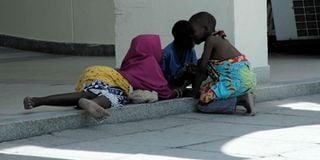Why street children need all our support

Street children playing in the streets of Mombasa on December 5, 2021. Rehabilitating street children is fraught with difficulties since it requires the collaboration of several stakeholders.
Rehabilitation facilities are viewed by society as an alternative means of assisting persons who have gone astray.
Even though it is regarded as an excellent morale booster, it has changed over time. Rehabilitation, particularly in Kenya, necessitates a completely new and multifaceted strategy.
Rehabilitating street children is fraught with difficulties since it requires the collaboration of several stakeholders.
According to the journal Addiction, the most commonly used drugs among street children are inhalants such as glue, acetone, gasoline and paint thinner, followed by tobacco, alcohol and marijuana. Street children gravitate toward inhalants because they are cheap and legal, and therefore easy to get.
Typically, street children are subjected to abuse, neglect and exploitation. These same children, like any other human being, require care, protection, and education.
Basic needs
The first step in rehabilitating street children should be to provide basic needs such as food, water and clothing for them.
Street children in Nairobi County believe that the treatments provided by rehabilitation institutions are not helpful to them, with the exception of receiving medicine to assist them to overcome their addiction. Those who have been there claiming they would prefer staying in the streets. Aside from that, no other type of education or skill knowledge is provided to these youngsters.
At the completion of the rehabilitation process, the children are released with no ability that would allow them to get a source of income. Thus, most of them normally end up going back to their lives as street children.
Even after rehabilitation, street children continue to feel excluded from society and mistreated, despite the fact that all they want is to fit in and live normal lives.
Because of inadequate rehabilitation programs, individuals lack the skills in earning a living and must turn to immoral ways such as theft, prostitution, and even drug dealing to survive.
It would be preferable if the government intervened and offered options to assist them in getting off the streets, like enrolling them in the National Youth Service (NYS) and getting equipped with skills like carpentry, masonry and tailoring. After all, we need productive citizens for the general growth of our country.
Furthermore, street children require emotional and psychological assistance, which may be offered through counselling, group activities, and mentoring programs.
All of the above is aimed at increasing self-confidence, establishing a sense of identity, and offering support and direction.
The street children should also be educated on the laws and social conventions, as well as kept up to speed on the available opportunities.
Keith Otieno and Lucky Oluoch, Nairobi




